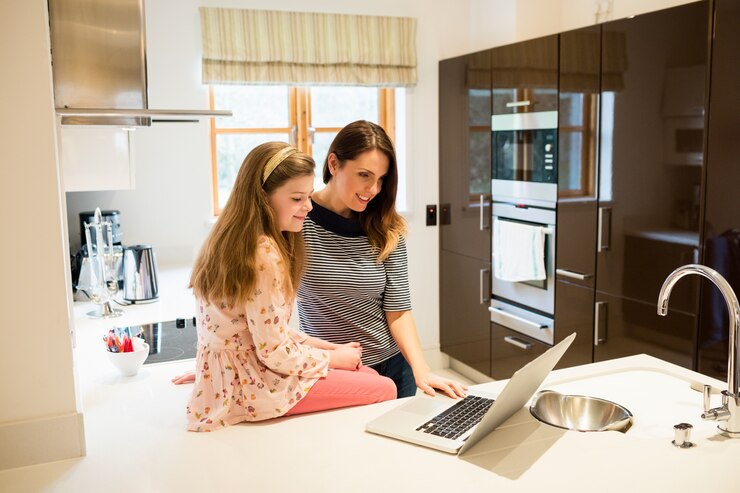The decision to choose between daycare and stay-at-home parenting is a complex one, with many different factors to consider.
Parents must weigh their own personal goals, their child’s needs, and their financial situation when deciding the best path for their family.
In today’s society, the availability of childcare options has expanded greatly, making it possible for many parents to continue working while their children are being cared for by someone else. But with so many choices, it can be difficult to determine which one is right for you and your family.
Advantages Of Daycare

1. Child Development
One of the main benefits of daycare is that it provides children with the opportunity to socialize and interact with other children their own age. This helps to develop their social skills, teamwork, and problem-solving abilities, which are essential for success later in life.
Additionally, many daycares offer structured activities and educational programs, which can help to improve children’s cognitive and motor skills.
2. Parental Employment and Career Advancement
For many parents, returning to work is a financial necessity, and daycare can provide a solution to this need. Daycare allows parents to maintain their employment and continue to advance in their careers, which can help to increase their earning potential over the long term. Additionally, it can provide parents with a sense of fulfillment and independence, which can positively impact their overall well-being.
3. Cost-Effective Option
In some cases, daycare can be a more cost-effective option than staying at home. For families with two working parents, the cost of daycare may be offset by the combined income of both parents. Additionally, some employers may offer assistance with childcare expenses through flexible spending accounts, which can help to reduce the overall cost.
Advantages Of Stay-At-Home Parenting

A. Bonding with Child
One of the most significant advantages of stay-at-home parenting is the opportunity to bond with your child. This can help to create a strong and lasting relationship, which is essential for children’s overall development and well-being. Additionally, staying at home allows parents to be present for important milestones, such as first steps, first words, and other important developmental milestones.
B. Flexibility
Staying at home also provides parents with a great deal of flexibility, which can be particularly important for those with young children. Parents who stay at home can be available for appointments and other important events and can be there for their children when they are sick or in need of support. Additionally, stay-at-home parenting allows parents to choose their own schedule and take time off when necessary, which can help to reduce stress and promote overall well-being.
C. Financial Savings
For some families, staying at home can be a more financially viable option than daycare. In many cases, the cost of daycare can be more than the cost of one parent’s salary, making it more cost-effective to stay at home. Additionally, staying at home can help to reduce the cost of transportation, clothing, and other expenses that are associated with working outside the home.
Factors To Consider When Choosing
When deciding between daycare and stay-at-home parenting, there are several key factors to consider.
These include:
- Cost: Daycare can be very expensive and can take a significant portion of a family’s income. On the other hand, staying at home with a child can be costly in terms of lost income and opportunities for career advancement.
- Quality of care: The quality of care a child receives is important for their growth and development. It is important to research the daycare options in your area and to carefully consider the education, experience, and credentials of the caregivers.
- Flexibility: The flexibility of each option is an important consideration for families. Daycare may provide more structure and stability, but it may also be less flexible in terms of scheduling. Stay-at-home parenting offers more flexibility, but it may also be less predictable.
- Child’s individual needs: Each child is unique and has different needs. Some children may thrive in a daycare setting with social interaction and structure, while others may do better with one-on-one attention at home. It is important to consider the individual needs of each child and what is best for their overall well-being.
- Parental stress and satisfaction: The level of stress and satisfaction of the parent is also a key factor to consider. Stay-at-home parenting can be isolating and stressful, while daycare can be stressful for some parents who worry about the quality of care their child is receiving. It is important to consider what will bring the most happiness and fulfillment for both the child and the parent.
Making A Decision

Making a decision between daycare and stay-at-home parenting is a personal and often complex decision. There is no right or wrong answer, and each family must weigh the pros and cons and make the best decision for their individual circumstances.
It may be helpful to discuss the options with trusted friends and family members, as well as to gather information and resources from reputable sources. Ultimately, the decision should be made based on the well-being of the child and the happiness of the family.
There are many various considerations to take into account while deciding between daycare and staying at home with the kids. When choosing the best course for their family, parents must consider their own personal aspirations, their child’s needs, and their financial condition.
The most crucial thing is to make an educated decision that is best for you and your family, whether you decide to use a daycare or stay at home with your children.
Conclusion
Choosing between daycare and stay-at-home parenting is a difficult decision that requires careful consideration of many factors. The availability of childcare and the cost, quality of care, flexibility, child’s individual needs, and parental stress and satisfaction should all be taken into account.
Ultimately, the decision should be based on what is best for the child and the happiness of the family. No matter what decision is made, it is important to remember that every family’s situation is unique, and there is no one right answer for everyone.
Read Also:



























